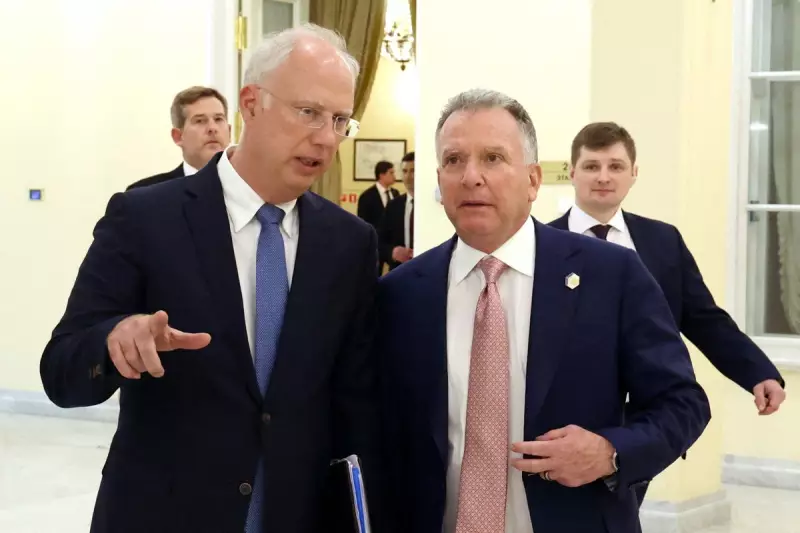
The controversial 28-point peace proposal for Ukraine presented by President Donald Trump, which has been criticised for heavily favouring Russian interests, has been revealed to involve a blacklisted Kremlin official. Kirill Dmitriev, a close ally of Vladimir Putin, participated in behind-the-scenes meetings with Trump's envoys prior to the plan's formulation.
Trump has issued an ultimatum to Ukrainian leader Volodymyr Zelensky, demanding he approve the deal by Thursday. The proposal would compel Ukraine to cede territory to Moscow, permanently forswear NATO membership, and support Russia's reinstatement into the G8. This has triggered significant concern among US officials and lawmakers, who are alarmed by the extent of Russian influence on the plan.
The Man Behind the Curtain: Who is Kirill Dmitriev?
Kirill Dmitriev holds the powerful dual roles of CEO of the Russian Direct Investment Fund (RDIF) and special presidential envoy on Foreign Investment and Economic Cooperation, a position he assumed on 23 February of this year. Despite his limited diplomatic background, he has become a pivotal, though controversial, figure in US-Russia relations.
Dmitriev's involvement came to light after it emerged that Trump's special envoy, Steve Witkoff, and the president's son-in-law, Jared Kushner, met with him in Miami at the end of October. This occurred despite Dmitriev and his fund having been under US sanctions since 2022, which are meant to prohibit American citizens and companies from engaging with them. The Trump administration circumvented this by issuing a special waiver to permit his entry, and Witkoff has met with Dmitriev on multiple occasions this year.
In an interview with Axios, Dmitriev confirmed his role in the talks, stating, "we feel the Russian position is really being heard." Critics have subsequently labelled the resulting 28-point plan as a "Russian wish list," a characterisation bolstered by Putin's welcoming response to it.
A Path to Influence: Dmitriev's Background and Methods
Born in 1975 in Soviet-era Kyiv, Dmitriev was described by former schoolmate, Ukrainian MP Volodymyr Ariev, as a hard-working yet arrogant pupil who was "obsessed with the United States." In 1989, he was among the first Soviet exchange students from Ukraine to visit the US, living with a host family in New Hampshire.
His academic journey was marked by rapid success. With no prior English schooling, he excelled at Foothill Community College in California before earning a BA in Economics from Stanford University and an MBA from Harvard Business School. He built his career at prestigious firms like McKinsey & Company and Goldman Sachs before his appointment as CEO of the RDIF in 2011.
An anonymous source who has known him for years told The Guardian that Dmitriev is "ruthlessly ambitious" and "exceptionally good at selling himself." This talent for self-promotion has allowed him to maintain relationships with Western power brokers despite sanctions. His history of coordinating with US officials includes working directly with Jared Kushner during the pandemic to arrange the delivery of Russian ventilators to the US, a move that raised alarm at the Treasury Department.
Concerns and Internal Tensions
The intelligence community in the US has expressed deep unease about the administration's dealings with Dmitriev. A Department of Justice report from Special Counsel Robert Mueller's investigation highlighted a 2017 meeting between Dmitriev and Trump ally Erik Prince to discuss US-Russia relations.
When the US Treasury imposed sanctions on him in 2022, it explicitly described him as a "known Putin ally" who leveraged his US connections to provide access for the Russian president. More recently, US Treasury Secretary Scott Bessent referred to Dmitriev as a "Russian propagandist."
Interestingly, Dmitriev's influence does not appear to be universally welcomed within the Kremlin's inner circle. Reports from Russia suggest he clashed with the notoriously bullish Foreign Minister, Sergey Lavrov. Ahead of a meeting with American officials in Saudi Arabia in February, Putin reportedly granted Dmitriev's request to join the talks without informing Lavrov. Upon learning this, Lavrov reportedly moved Dmitriev's chair away from the table, insisting that Putin himself would have to give the order for his inclusion.
As the deadline for Ukraine's decision looms, the central role of this sanctioned Kremlin operative in shaping a US peace plan continues to raise profound questions about the direction of American foreign policy and its implications for the ongoing conflict.





